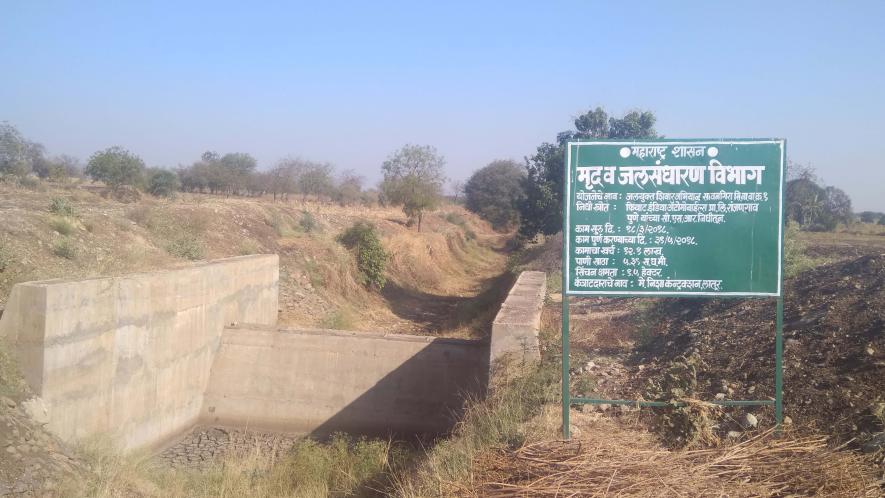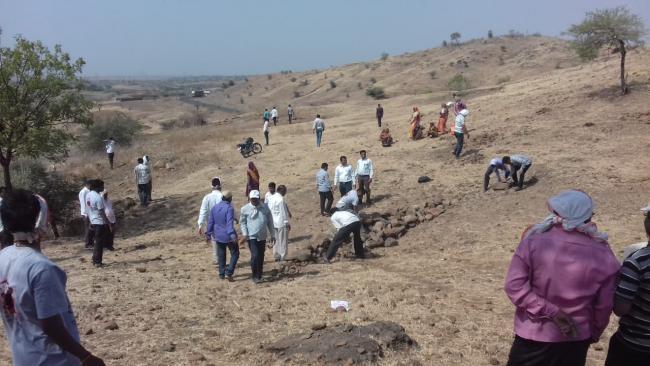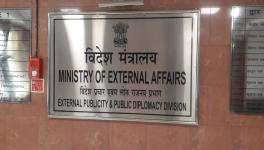#MahaDrought: State Flagship Programme of Micro Irrigation Fails to Give Any Respite

[Maharashtra is facing one of the most severe droughts since 1972, with the state government declaring drought in 180 tehsils out of 350. Entire Marathwada (spread across Southern and Eastern Maharashtra) region is in dire condition now. This is part 9 of the series of ground reports by Newsclick.]
Villagers at Sawangira village of Nilanga tehsil in Latur district have an interesting tale of the Jalyukta Shivar scheme, a flagship micro irrigation program of the Maharashtra government. “My farm is adjoining to one of the Jalyukta Shivar project. One day a JCB came, dug up something and went away. After a few days, they put a board declaring the completion of the project. Its totally bogus, there is no use at all,” said Sharad Somvanshi of Sawangira. All the other villagers standing there nodded in agreement. As Maharashtra is facing one of the severe droughts since 1972, here is the reality of the government’s highly publicised micro irrigation scheme.
Jalyukta Shivar means ‘a farm full of water’. Its aim is to provide adequate water to farmers and villages through number of micro irrigations works including CCT, Deep CCT, Nala Bunding, Nala widening and others. This was launched by the Bharatiya Janata Party-led government in 2015, a year after coming to power in the state. Since then, around Rs 8,808 crore have been spent on the scheme and is still being projected as a ‘game changer’ in irrigation. But the reality is different, and its history is politically influenced. So, let’s try to get a sense of that first.
The erstwhile Congress and Nationalist Congress Party government had faced corruption charges over irrigation programs. The current Chief Minister Devendra Fadnavis, who was then a prominent young MLA of BJP, was one of the most aggressive voices levelling allegations of corruption amounting to over Rs 70,000 crore the irrigation sector of Maharashtra. The attack was particularly on Ajit Pawar, NCP leader and then Deputy Chief Minister as he had handled the department for 10 years.
Also Read: #MahaDrought: Negligible Returns From the PM’s Insurance Scheme For Farmers
So, when BJP rose to power, it launched the Jalyukta Shivar scheme for irrigation, which could have been less expensive but more effective. There was a mini scale model of micro irrigation in Pune district. Even in this case, the same repeated as in the case of Sawangira village. It was, in a way, a pilot program launched by the government in Pune and later in Satara district of Western Maharashtra.
Sources revealed that CM Fadnavis was himself keen to launch it state-wide, to show that his government is working hard to get Maharashtra’s land irrigated.
But, now almost three years have passed and there has been no change on the ground. Maharashtra faced consecutive droughts in 2013, 2015, 2017 and 2019. The current drought is one of the most severe that the state has witnessed, with only an average of 65 per cent rainfall this year. In the backdrop of this drought, Jalyukta Shivar was expected to end the problems of villages where the scheme has been implemented.
Scheme Handed Over to Private Contractors
The idea of the scheme was to include people for irrigation work in their village and they would be given technical assistance by the state government. “But it has now gone into the hands of contractors. Those who have JCBs, they get work and later there is no work. That’s the biggest problem of the scheme now,” said Professor HM Desarada, who has filed a petition in Bombay High Court against the implementation of scheme.
Prof Desarada’s accusations are supported by the reality of a number of villages across Maharashtra. In the same tehsil, there is a village name Mugav. In a recent program when several other government schemes were inaugurated, there was mention of the successful implentation of Jalyukta Shivar in the village. The villagers were taken by surprise when they heard this. “Where is any Jalyukta Shivar project in our village? We just came to know about it through the advertising pamphlets of government,” said Vijaykumar Chandarao Patil of Mugav.
Also Read: #MahaDrought: Bore Wells Get Deeper and Dryer
Bombay High Court has appointed a committee under former chief secretary Johny Joseph to find out the truth on Prof HM Desarada’s PIL. It has submitted the report to court. But there are a number of loopholes in the report. Irrigation experts of Maharashtra are also arguing for stopping this scheme immediately for various reasons.
“This scheme is highly unscientific. There is no proper guidance on how much digging should be done in Nala. There is a complete lack of expertise in handling sensitive sources of water under the surface. Digging anywhere just to employ a JCB owner has left underground water sources open and exposed. Forget helping in irrigation, this work is now damaging the possibility of irrigation itself,” said Pradeep Purandare, who is a water expert with the highly recognised Water and Land Management Institution (WALMI).
Pani Foundation: A People’s Micro Irrigation Project
Now let’s come to the story of Jaybhaywadi village of Dharur tehsil in Beed district. Similar to the government’s Jalyukta Shivar scheme, there is a people’s movement for micro irrigation. It is known as the Pani Foundation, promoted by like-minded people, with Bollywood superstar Amir Khan as the brand ambassador. This movement is three years old and had taken roots in the barren area of Maharashtra.

Villagers working under the Pani Foundation in Hivra village in Bhoom tehsil.
In 2017, Jaybhaywadi had secured the second position in a state level competition organised to compare the work being done by villagers under the Pani Foundation.
Also Read: #MahaDrought: Farm Failure Spurs ‘Permanent’ Migration from Marathwada
“In our village, Pani Foundation’s work is now giving results. Water level of wells in villages has increased. People participate voluntarily and are now getting benefits of their labour. But the Jalyukta Shivar work in our village does not stand anywhere close for comparison. The contractors do not work as seriously as the villagers,” said the newly elected Deputy Sarpanch Dr Arjun Jaybhay. “This is the reality of the scheme everywhere now,” he added.
Maharashtra is in dire need of micro irrigation work and that too with consistent efforts. There are several successful examples of villages which have benefitted from micro irrigation like Ralegan Siddhi, famous for social activist Anna Hazare or Hivare Bajar, another highly successful village in saving every drop of rain.
Jalyukt Shivar was also launched with the same aim, but it seems that it has failed miserably. “Had they given those Rs 12 lakh to us, we would have come up with better work. It would have helped us in this time of drought,” said Kamalakar Jadhav of Sawangira village. The failure of this scheme is a reminder of the need of people’s participation to fight drought over contractor-driven schemes by state government.
Get the latest reports & analysis with people's perspective on Protests, movements & deep analytical videos, discussions of the current affairs in your Telegram app. Subscribe to NewsClick's Telegram channel & get Real-Time updates on stories, as they get published on our website.
























